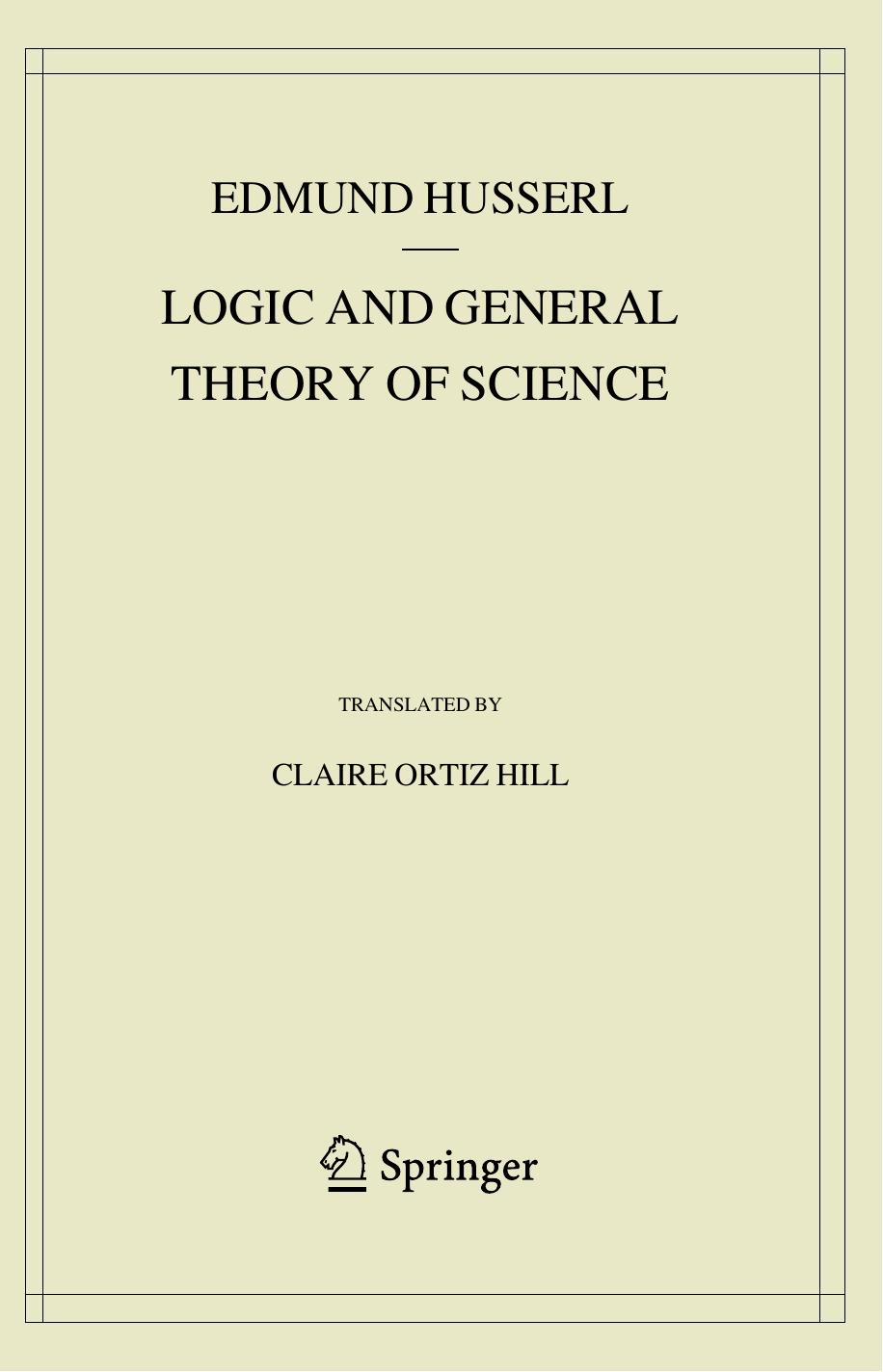Logic and General Theory of Science by Edmund Husserl

Author:Edmund Husserl
Language: eng
Format: epub, pdf
ISBN: 9783030145293
Publisher: Springer International Publishing
<d) The Concept of Inexistence. The Impersonals (Definite Categorical or Functional) Are Existential Propositions in This Sense of Existence>
The concept of existential judgment is by no means completely unshakably defined. A fixed definition was obtained by identifying the concepts existential judgment and particular judgment, because the latter concept is fully defined. But, this identification will not as a rule be countenanced. The term existential judgment is not as a rule used in this sense.
A certain range of related instances of application of discourse about existing is traceable back to the concept of inexistence, to the concept of being-in-something. It can be said of a subject that it <may be> a part of some whole, an item of some collection (of a multiplicity) in some context (for example, in a spatiotemporal context). Related to that is also being-somewhere or -at-some-time. We often use “somewhere” broadly in a non-localized sense for every being-in-something. People then often say “let the object exist”, let it exist within the context, let it be “existent”, present, there. For events too, “they take place” and so on. There is a number in the number series. There is the book in the library, the letter in the box, etc. The letter is no more. It is “no longer existent”. It has been burned.
186The being-in-something, -somewhere, -at-some-time is often stated in incomplete predication, provided the context is intended, but not stated, often, however, even in indefinite, namely, functional predication. In affirming such statements, we arrive at particular judgments. If we initially still keep both cases together, the undeniable ambiguity of what is called the copula, of the little word “is” results, insofar as the “is” frequently also means “exists”, and “exists” contains a relative, namely, the being-in-something. Where, however, the Is acts as pure copula of the categorical judgment, we can never instead say “exists” for it. For example, for “The castle is a Renaissance building”, we cannot say “The castle exists a Renaissance building”. In contrast, wherever we say “being in something”, “being somewhere, at some time”, “exists” can be substituted there. The thing exists here, there, now. It exists in the room, as part in the whole, and so forth. For “exists” we then frequently say “there is”. Obviously, all impersonals are existential statements in this sense. We can substitute the “exists” precisely in this sense everywhere in them. “It is raining = raining exists”, and obviously “here” and “now” is to be added. “There is a dance, it is, it exists”, namely, “at the Green Tree”, “today”, and so forth. “Money is lacking: No money exists in the cash register”. “There are polyhedrons, polyhedrons are, exist in space, or among geometrical shapes”, and so forth. Naturally, relations can also play out in the ideal sphere, and infinite aggregates, infinite extensions of concepts can act as members of relations for surrogative reasoning, as ones in which something exists.
Not all the individuations exhibiting the relations relevant here belong in a theory of forms of relation-judgments or in a
Download
Logic and General Theory of Science by Edmund Husserl.pdf
This site does not store any files on its server. We only index and link to content provided by other sites. Please contact the content providers to delete copyright contents if any and email us, we'll remove relevant links or contents immediately.
Enlightenment Now: The Case for Reason, Science, Humanism, and Progress by Steven Pinker(7311)
A Journey Through Charms and Defence Against the Dark Arts (Harry Potter: A Journey Through…) by Pottermore Publishing(4811)
The Immortal Life of Henrietta Lacks by Rebecca Skloot(4587)
A Journey Through Divination and Astronomy by Publishing Pottermore(4385)
Elon Musk by Ashlee Vance(4127)
Origin Story: A Big History of Everything by David Christian(3692)
COSMOS by Carl Sagan(3623)
Alchemy and Alchemists by C. J. S. Thompson(3520)
Bad Pharma by Ben Goldacre(3427)
Enlightenment Now by Steven Pinker(3368)
Shadow of Night by Deborah Harkness(3367)
Inferior by Angela Saini(3313)
A Mind For Numbers: How to Excel at Math and Science (Even If You Flunked Algebra) by Barbara Oakley(3306)
Origin Story by David Christian(3201)
The Code Book by Simon Singh(3189)
Signature in the Cell: DNA and the Evidence for Intelligent Design by Stephen C. Meyer(3138)
The Elements by Theodore Gray(3057)
A Brief History of Time by Stephen Hawking(3024)
A Journey Through Potions and Herbology (A Journey Through…) by Pottermore Publishing(2852)
